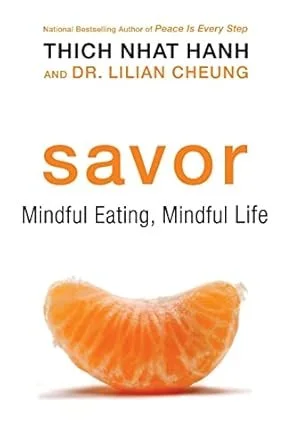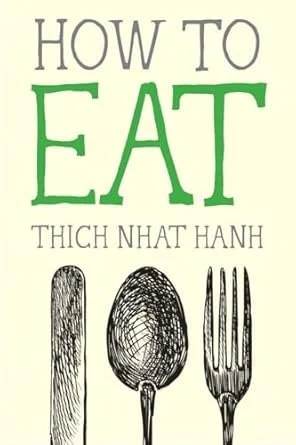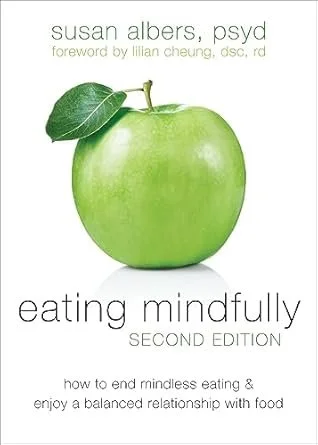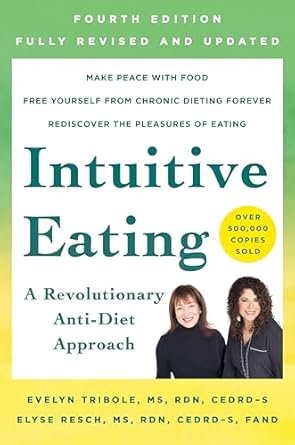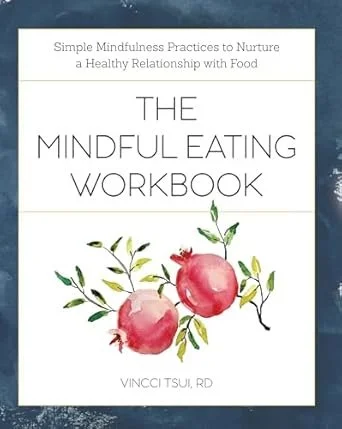5 Books You Should Read to Cultivate Mindful Eating: A Guide to Healthier Habits
In today's fast-paced world, mindful eating offers a refreshing approach to nourishing our bodies and minds. Unlike traditional dieting and the pressure of diet culture, mindful eating emphasizes that how we eat can be as important as what we eat. This practice encourages us to be present and fully engaged during meals, focusing on the flavors, textures, and sensations of our food.
The physical benefits are significant: improved digestion, better metabolic markers, and fewer weight fluctuations. Mentally, it reduces stress and helps us reconnect with our body's hunger and fullness cues. Mindful eating also allows us to enjoy the foods we crave and love while still maintaining our healthiest selves.
In this blog post, we will recommend five essential mindful eating books to help you cultivate a mindful eating approach. These books provide valuable insights, practical tips, and inspiration for both beginners and those looking to deepen their practice. Let's explore these resources to enhance your mindful eating journey.
What is Mindful Eating?
Mindful eating is a practice rooted in the Buddhist concept of mindfulness, which involves being fully present and engaged in the current moment. When applied to eating, mindfulness encourages us to focus on the experience of our meals rather than just the food itself. This means paying attention to the colors, smells, textures, and flavors of our food, as well as our body’s hunger and fullness signals.
The principles of mindful eating differ significantly from traditional dieting. Instead of imposing strict rules about what and how much to eat, mindful eating fosters a neutral approach to food. It’s about how we eat and experience our meals, emphasizing the importance of the process rather than the specific foods consumed. This approach helps us develop a healthier relationship with food over time.
Practicing mindful eating can have profound impacts on both mental and physical health. Mentally, it helps reduce stress and anxiety related to eating, promoting a more relaxed and enjoyable dining experience. It can also decrease tendencies to binge or over-restrict, including helping to manage symptoms of binge eating disorder, as it encourages a balanced and intuitive approach to food.
Physically, mindful eating can improve digestion, enhance metabolic markers, and help us maintain a stable weight by aligning our eating habits with our body’s natural hunger and fullness cues. By paying attention to these signals, we can better understand when we are truly hungry and when we are satisfied, leading to more mindful and intentional eating patterns.
Why Read About and Practice Mindful Eating?
Understanding the philosophy and practice of mindful eating is essential for cultivating lasting habits. When we grasp the "why" behind mindful eating—its principles, benefits, and impact on our well-being—we are more likely to integrate it into our daily lives.
Books on mindful eating offer valuable insights from experts in the field. They provide a deeper understanding of how mindful eating can improve our relationship with food and enhance our overall health. By reading about different approaches and strategies, we gain practical tools that empower us to apply mindful eating principles in real-life situations.
Moreover, books inspire us with stories, tips, and personal experiences that motivate and encourage us on our mindful eating journey. They offer a wealth of knowledge that goes beyond simple dietary guidelines, helping us develop a sustainable and enjoyable approach to eating.
Ultimately, the more we understand the "why" behind mindful eating—its benefits for physical and mental health, its role in reducing stress and improving digestion—the more motivated we become to adopt and maintain this beneficial practice in our daily lives.
Recommended Books for Mindful Eating
On your journey toward mindful eating, educating yourself with insightful resources can significantly enhance your understanding and practice. Here are five essential books that offer valuable guidance and inspiration:
Book 1: "Savor" by Thich Nhat Hanh and Dr. Lilian Cheung
Overview: "Savor" combines the wisdom of Zen Master Thich Nhat Hanh with the nutritional expertise of Harvard nutritionist Dr. Lilian Cheung. It explores mindful eating as a means to nourish both your body and mind, offering practical guidance on cultivating mindfulness during meals.
Key Takeaways and Insights: The book emphasizes the importance of mindfulness in every aspect of eating—from choosing healthy foods to appreciating the preparation and consumption process. It encourages you to eat with awareness and gratitude, fostering a deeper connection to food and yourself.
How it Helps with Mindful Eating: "Savor" provides mindfulness exercises and meditations that you can incorporate into your daily eating routines. By practicing these techniques, you can develop a more conscious approach to eating, leading to improved digestion, reduced stress, and a healthier relationship with food.
Book 2: "How to Eat" by Thich Nhat Hanh
Overview: Another profound work by Thich Nhat Hanh, "How to Eat" delves into the practice of mindful eating through the teachings of Buddhism. It focuses on practical techniques that integrate mindfulness into your eating habits, emphasizing joy and peace in every meal.
Key Takeaways and Insights: Unlike "Savor," which provides a broad exploration of mindful living and eating, "How to Eat" offers specific, actionable practices such as mindful chewing, eating slowly, and appreciating the origin of your food. Thich Nhat Hanh guides you to cultivate a deeper awareness of the present moment during meals.
How it Helps with Mindful Eating: "How to Eat" equips you with practical techniques like mindful breathing and simple meditations that you can incorporate into your daily meals. These practices deepen your connection with food, enhance digestion, and foster a profound sense of gratitude and satisfaction with each eating experience.
Book 3:"Eating Mindfully" by Susan Albers, PsyD
Overview: In "Eating Mindfully," Dr. Susan Albers explores the psychology behind eating habits and offers practical strategies to cultivate mindfulness during meals. Drawing from cognitive-behavioral techniques, the book provides insights into how your emotions and thoughts influence your eating behaviors.
Key Takeaways and Insights: Dr. Albers emphasizes the importance of mindfulness in addressing emotional eating and promoting a healthy relationship with food. She offers exercises and reflection prompts that help you become more aware of your eating triggers and habits.
How it Helps with Mindful Eating: "Eating Mindfully" provides concrete steps to integrate mindfulness into your daily eating routines. By understanding the psychological aspects of eating, you can develop strategies to overcome overeating tendencies, improve digestion, and enhance overall well-being through mindful eating practices.
Book 4:"Intuitive Eating" by Elyse Resch and Evelyn Tribole
Overview: "Intuitive Eating" challenges traditional dieting norms by advocating for a non-restrictive approach to eating based on listening to your body's hunger and fullness cues. Elyse Resch and Evelyn Tribole present a framework that promotes self-care and body acceptance through mindful eating practices.
Key Takeaways and Insights: The book encourages you to reject dieting mentality and instead trust your body's signals to guide your eating decisions. It emphasizes self-awareness, satisfaction, and pleasure in eating, promoting a balanced and sustainable relationship with food.
How it Differs from Mindful Eating: While both intuitive eating and mindful eating emphasize awareness and present-moment focus, they differ in their primary focus. Mindful eating, as part of the practice of intuitive eating, specifically emphasizes the mindful approach to eating, including savoring flavors, textures, and sensations during meals. Intuitive eating encompasses a broader approach to listening to and honoring your body cues beyond just mealtime mindfulness.
How it Helps with Mindful Eating: "Intuitive Eating" provides practical tools such as the 10 principles of intuitive eating, which include mindful eating practices. By incorporating these principles, you can cultivate a balanced relationship with food, reduce emotional eating, and achieve long-term weight stability.
Book 5: Mindful Eating Workbook: Simple Practices for Greater Health and Well-Being by Vincci Tsui, RD
Overview: This workbook offers practical exercises and mindful eating techniques to help you develop a healthier relationship with food. It provides step-by-step guidance on incorporating mindfulness into your eating habits, fostering awareness of hunger cues, and promoting a balanced approach to nourishment.
Key Takeaways and Insights: Vincci Tsui, a registered dietitian specializing in intuitive eating and mindful eating practices, combines nutritional expertise with mindfulness techniques in this workbook. It includes mindfulness exercises, self-assessment tools, and journal prompts that encourage reflection and growth in mindful eating habits.
How it Helps with Mindful Eating: The Mindful Eating Workbook by Vincci Tsui equips you with actionable strategies to cultivate mindfulness during meals. It promotes mindful practices such as mindful chewing, savoring food, and recognizing emotional triggers for eating. Through these exercises, you can develop a sustainable and positive relationship with food and your body.
Exploring these five essential books provides a diverse array of perspectives and practical tools to enhance your journey towards mindful eating. Each resource offers unique insights and actionable strategies to foster mindfulness, improve digestion, reduce stress, and cultivate a balanced relationship with food. Whether you're just starting your mindful eating journey or seeking to deepen your practice, these recommendations are invaluable companions. Start by picking one book that resonates most with you, and incorporate its teachings into your daily routine to begin experiencing the benefits of mindful eating firsthand.
Section 4: Practical Tips for Applying Mindful Eating
Drawing from the insights of the recommended books, here are some practical and often overlooked tips to help you start applying mindful eating in your daily life:
1. Create a Mindful Eating Environment
One common theme across these books is the importance of the environment in which you eat. To cultivate a mindful eating practice:
Eliminate distractions: Turn off your TV, put away your phone, and create a calm, distraction-free space for eating.
Set the scene: Use a table setting that you find aesthetically pleasing. Light a candle, play soft music, or sit by a window. Making your eating space enjoyable enhances the mindfulness experience.
2. Engage All Your Senses
Mindful eating is not just about taste. Engage all your senses to fully appreciate your food:
Sight: Notice the colors and presentation of your food. Appreciate the visual appeal.
Smell: Take a moment to breathe in the aroma before you begin eating. This can stimulate your digestive juices and enhance your sensory experience.
Touch: Feel the textures of the food in your hands and mouth. Notice the different sensations.
Sound: Pay attention to the sounds of your food as you eat, such as the crunch of a vegetable or the sizzle of a dish.
3. Practice Gratitude
Expressing gratitude can deepen your mindful eating practice:
Reflect on the journey: Consider the effort that went into bringing the food to your plate—from the farmers who grew it, to the people who transported and sold it, to the person who prepared it (even if it's you).
Gratitude ritual: Before you eat, take a moment to silently thank everyone involved in the process, including nature for providing the ingredients.
4. Tune Into Your Body’s Signals
Listening to your body’s signals is crucial for mindful eating:
Hunger and fullness cues: Regularly check in with your body before, during, and after eating. Ask yourself how hungry or full you feel and respect these signals.
Emotional vs. physical hunger: Learn to differentiate between eating out of emotional need and eating due to physical hunger. Use mindful breathing or a brief meditation to address emotional needs without food.
5. Chew Thoroughly and Slowly
Chewing your food thoroughly and eating slowly are fundamental practices in mindful eating:
Count your chews: Try counting your chews per bite, aiming for 20-30 chews before swallowing. This helps break down food for better digestion and gives you more time to savor each bite.
Put down your utensils: Between bites, put down your fork or spoon. This simple act can slow down your eating pace and make you more aware of the eating process.
6. Mindful Portion Control
Mindful portion control can prevent overeating and promote satisfaction:
Use smaller plates: Opt for smaller plates and bowls to naturally encourage smaller portions. This visual trick can help you feel satisfied with less food.
Serve mindfully: Instead of eating directly from a package or large dish, serve yourself a portion on a plate. This helps you see exactly how much you’re consuming.
7. Practice Mindful Cooking
Mindful eating begins in the kitchen:
Cook with intention: Pay attention to the process of cooking. Notice the textures, colors, and smells of ingredients as you prepare your meal.
Involve your senses: Engage your senses while cooking. Feel the textures of ingredients, listen to the sizzle of cooking, and enjoy the aromas.
Encouragement for a Healthy and Joyful Relationship with Food
Incorporating mindful eating into your daily life may seem challenging at first, but it becomes more natural with practice. Start with small changes, such as eating one meal mindfully each day. Gradually, expand these practices to more meals. Remember, mindful eating is a journey, not a destination. Be patient and compassionate with yourself as you explore this practice.
By integrating these tips into your daily routine, you’ll begin to experience the profound benefits of mindful eating. Improved digestion, better metabolic markers, and fewer weight fluctuations are just a few of the many advantages. Most importantly, you’ll develop a healthier, more positive relationship with food.
Conclusion and Call to Action
Mindful eating offers numerous benefits, including improved digestion, better metabolic markers, and fewer weight fluctuations. The recommended books provide valuable insights and practical tools to help you cultivate mindful eating habits. By exploring these resources, you can enhance your journey towards a healthier, more balanced relationship with food.
Dive into these books to deepen your understanding and practice of mindful eating:
For personalized guidance on starting your mindful eating journey,book a complimentary call here. Let’s work together to make mindful eating a lasting habit in your life.


